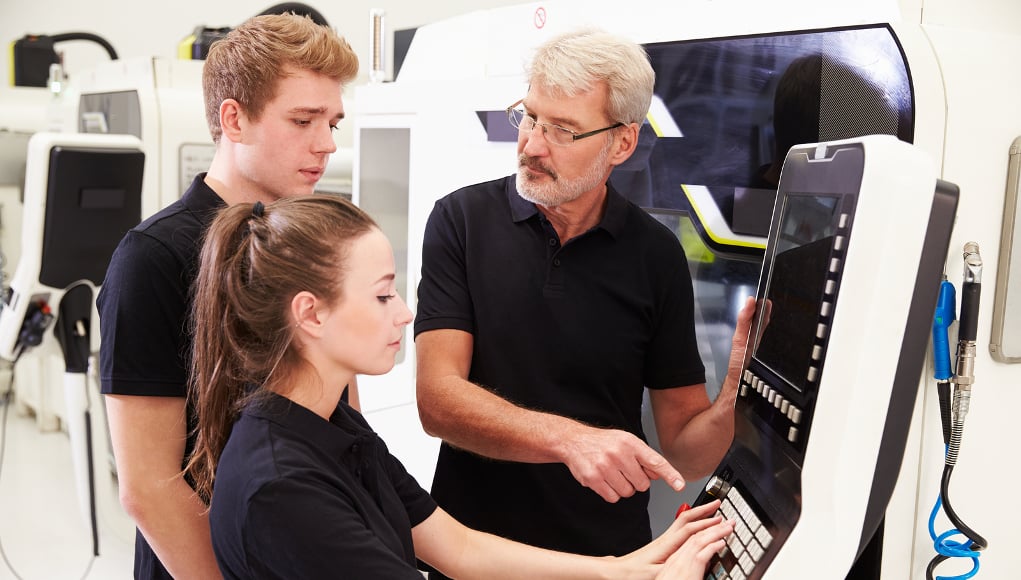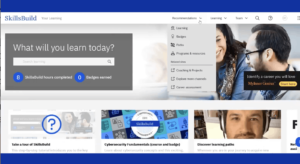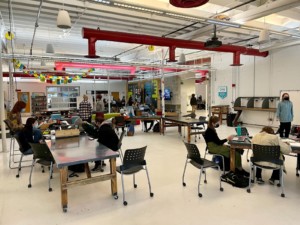The Future of Work: Building Entrepreneurship Skills in K-12

There’s no doubt or way to avoid it–the world is changing. In fact, it’s changing faster than it ever has before and the future of work (#FutureOfWork) in particular is changing in more dramatically different ways than we’ve ever experienced before. These shifts, along with the rise of artificial intelligence (which we researched and recently wrote about) and the new economy, will require students to learn new and different skills than those traditionally taught in schools.
Gone, or soon to be gone, are the days of young adults starting a career and working in it for numerous years, sometimes even until retirement. Many will instead work as freelancers doing a variety of work and, as my nieces and nephews would say, they’ll have to “hustle.” I’m sure that my daughter will hold multiple jobs before she’s 30, and will likely own her own business and work for more than one organization at any given time.
In order for students to leave high school and enter college or careers prepared to succeed, they need to possess a set of entrepreneurial skills and be able to articulate their work and what they’re capable of. Skills like design thinking, project management, and simply learning how to work with and for a variety of people are becoming increasingly important. Unfortunately, there’s a skills demand that we’re currently not meeting.
This concern about the skills demanded in the ever-evolving new economy represents a challenge that many educators and leaders are trying to address. These include those that are implementing project-based learning, design thinking, technology integration, coding and more into their academic programs throughout K-12. This urgency is centered around many things including the ever-emerging “Gig Economy,” where as many as 50% of us are going to be operating as independent contractors and freelancers.
But, how can we directly try to address this skills gap? One way is through entrepreneurial education. This is an emerging trend that is being seen in ways including but not limited to, online curriculum, new courses and pathways, academies, work-based learning and even entrepreneurial schools.
Additionally, the data supports the notion that this shift is important in many ways. Recent surveys showed that 94% of millennials believe that entrepreneurial education is important, 72% of current high schoolers are interested in being entrepreneurs and that ⅔ of all students surveyed have not had any entrepreneurial training or education – or what they have had was inadequate.
The challenge set forth for educators and schools is to create and cultivate learning cultures and environments that truly teach students to think unconventionally, and that nurture unconventional talents, skills and more.
Leading this effort from the higher education level is Arizona State University. Their online high school ASU Prep Digital has four entrepreneur courses available to their full-time online learners but can also serve as a supplement to schools looking to start or enhance an entrepreneurship class. (See ASU Prep Digital’s recent blog on the seven courses students should take to upskill their entrepreneurial skill set).
Entrepreneurship courses, curriculum and schools are undoubtedly going to continue to expand throughout the K-12 world as we continue to support students in preparing for the future of work. While we think ASU Prep Digital is a great solution, here are a few additional suggestions to get students started now:
- Student Startups. What if we created opportunities for students to launch ideas? Why not have students take ideas from science class and make them full startup projects? Giving students the opportunity to take their idea from proof to concept or even pitch it on Kickstarter creates real-world learning experiences and entrepreneurial skills.
- Competition is Key. Get students comfortable with, and ready to, compete! As often as you can, get students in front of their peers, adult mentors and community partners/experts to practice pitching their ideas and concepts. School principals have started competitive events where students design and pitch ways to address school-wide challenges (bullying, internet safety, drugs and alcohol abuse, anxiety, school safety, etc.) ultimately leading to the best idea(s) being implemented by the school. Additionally, the World Series of Entrepreneurship is a national high school competition series that’s open to all students, schools, and programs. Students compete on the local, regional, and national level for venture funding, scholarship dollars, and internship opportunities.
- Cultivate Design Thinking. As Getting Smart Columnist Michael Niehoff writes, design thinking is centered on pedagogy aimed at “creating and facilitating future innovators and breakthrough thinkers.” The creative and collaborative skills needed to tackle big problems and uncover new solutions are necessary for all entrepreneurs.
- Research & Interviews. At the core of entrepreneurship is empathy and research. Give students the opportunity to learn and practice both of these valuable skills. Use that research as an opportunity to get students writing more. Showing what they’ve learned and learning how to share it out to an audience in various formats, including blogs, social media, through reports and more.
- Create Digital Portfolios. As part of the writing students are doing, make sure they’re learning how to show what they know. As an entrepreneur, you have to be confident and skilled at sharing your work. This can start in K-12 classrooms. Plus, students can take their digital portfolios with them to college and into their careers to show their experience and mastered skill sets.
One thing is for sure–the skills that contribute to entrepreneurship are skills that will be valuable for a wide range of career paths in the coming years and decades. We should be working to help our students develop those skills.
For more, see:
- Preparing Students for Future of Work: What is the Gig Economy?
- The Only Constant is Change: Adjusting Our Practices to Meet the World’s Expectations
- Design Thinking and Other Learning Priorities to Educate Today’s Students for the Coming Automation Economy
- Getting Ready for the Jobs of the Future
Stay in-the-know with all things EdTech and innovations in learning by signing up to receive the weekly Smart Update. This post includes mentions of a Getting Smart partner. For a full list of partners, affiliate organizations and all other disclosures, please see our Partner page.






0 Comments
Leave a Comment
Your email address will not be published. All fields are required.